A review two years after changing hands.
ENGLISH interview with Julia A. Miller & Elbio Barilari by Franky Bruneel. Published in “Back To The Roots” magazine.
“It was therefore no surprise when in May 2018 the news came that Bob Koester had sold the label Delmark Records, to a musician couple, or so it went. But at that time Julia A. Miller and Elbio Barilari were relatively unknown in the blues world. Two years later, we firmly believe that no one is better suited to secure the future of Delmark and the Chicago blues. Together with Elbio and Julia, we are drawing up an interim assessment of the reborn record label”, says Franky Bruneel in the introduction of his feature article on Delmark Records and his interview with Julia Miller, CEO & President of the label, and Elbio Barilari, its Artistic Director. Bruneel is the Editor of the Belgian magazine “Back To the Roots” one of the most well respected blues publications in the world. Read complete English translation.
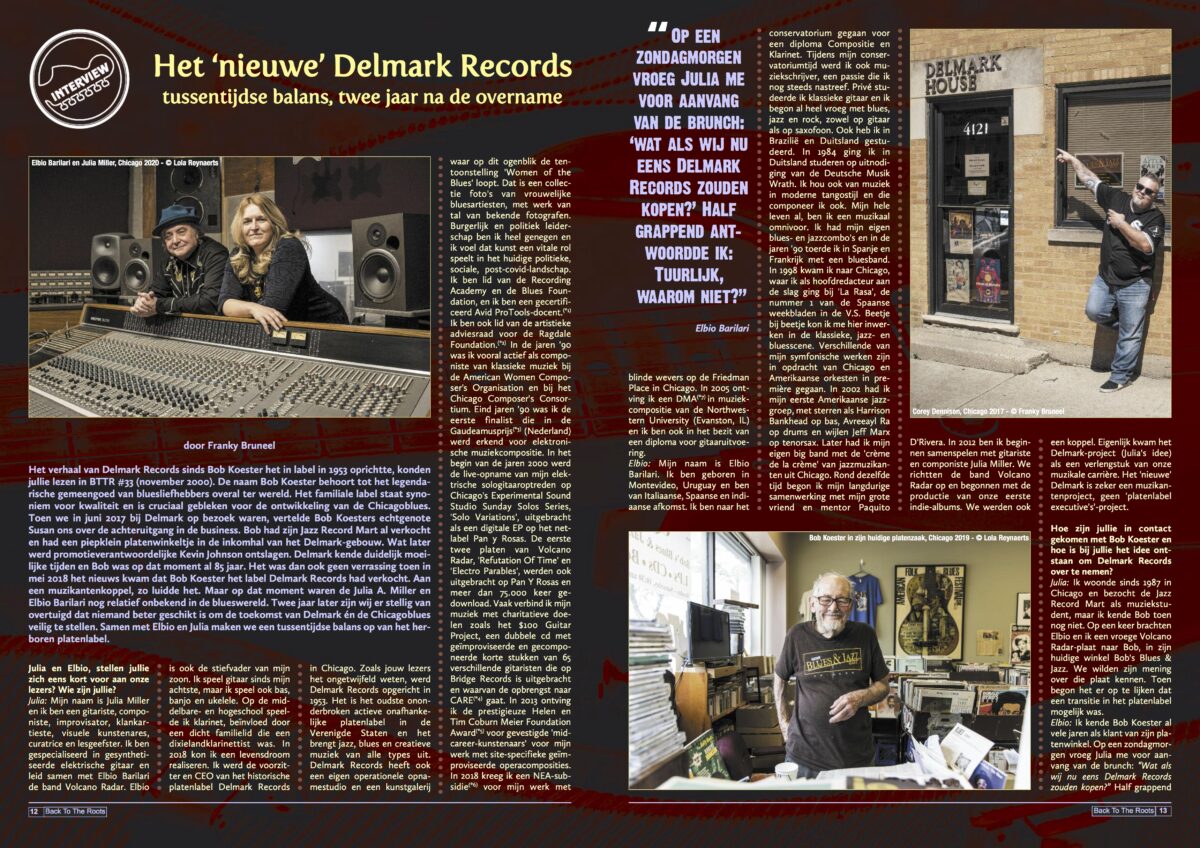
The history of Delmark Records since Bob Koester founded the label in 1953 can be found in BTTR # 33 (November 2000). The name Bob Koester is legendary among blues lovers all over the world. The family label is synonymous with quality and has proven to be crucial for the development of the Chicago blues. When we visited Delmark in June 2017, Bob Koester’s wife Susan told us about the decline in the business. Bob had already sold his Jazz Record Mart and had a tiny record shop in the entrance hall of the Delmark building. A little later, promotion manager Kevin Johnson was fired. Delmark was clearly going through rough times, and Bob was already 85 years old at the time. It was therefore no surprise when in May 2018 the news came that Bob Koester had sold the label Delmark Records to a musician couple, or so it went. But at that time Julia A. Miller and Elbio Barilari were relatively unknown in the blues world. Two years later, we firmly believe that no one is better suited to secure the future of Delmark and the Chicago blues. Together with Elbio and Julia, we are drawing up an interim assessment of the reborn record label.
By Franky Bruneel
JULIA: My name is Julia Miller and I am a guitarist, composer, improviser, sound artist, visual artist, curator and educator. I specialize in synthesized electric guitar, and I co-lead the band Volcano Radar, along with Elbio Barilari, who is also my son’s step-father. I’ve played the guitar since I was eight years old, and I also play the bass, banjo, and ukelele. I played the clarinet in high school and college, influenced by a close relative who was a Dixieland clarinetist.
In 2018, I realized a lifelong dream and became the President and CEO of the historic Chicago record label, Delmark. As your readers most likely know, Delmark was founded in 1953, and is the oldest continuously operating independent record label in the US, releasing jazz, blues, and creative music of all types. Delmark House also holds a working recording studio and an art gallery which currently hosts “Women of the Blues”, a collection of photos of female blues artists by many notable photographers.
I am committed to civic and political leadership, and I feel that arts have a vital role in the current political, social, post-COVID, landscape. I am a member of the Recording Academy, the Blues Foundation, and am a certified ProTools/AVID instructor. I am also an Artistic Advisory Board member for the Ragdale Foundation. Throughout the 90’s, I was particularly active as classical music composer with the American Women Composer’s organization, and with the Chicago Composer’s Consortium.
In the late 90s, I was the first finalist recognized for electronic music composition in the Gaudeamus Prize (Netherlands). In the early 2000’s live recording of my solo electric guitar performance on Chicago’s Experimental Sound Studio Sunday Solos Series, “Solo Variations”, was released as a digital EP on the netlabel Pan y Rosas. Volcano Radar’s first two records, “Refutation of Time” and “Electro Parables”, were also released on Pan Y Rosas, and downloaded more than 75,000 times.
Often I link my music to charitable causes such as the $100 Guitar Project, a double CD of improvised and composed short pieces by 65 different guitarists which was released on Bridge Records with proceeds benefitting CARE. In 2012, I was a recipient of the prestigious Helen and Tim Coburn Meier Foundation Award for established mid-career artists for my work with site-specific improvised opera compositions. In 2018, I was awarded an NEA grant for my work with blind weavers at Chicago’s Friedman Place. I received a DMA in music composition from Northwestern University (Evanston, IL) in 2005, and I also hold guitar performance degrees.
ELBIO: My name is Elbio Barilari, I was born in Montevideo, Uruguay, of Italian, Spanish and Native American descent. I went to the Conservatory for degrees in Composition and Clarinet. During my Conservatory time I became also a music writer, a passion that I still pursue. Privately I studied classical guitar and started very early to play blues, jazz and rock, both on guitar and sax. I also studied in Brazil and Germany. In 1984 I went to study in Germany with an invitation of the Deutsche Musik Wrath. I love and compose music in modern tango style as well. My whole life I have been musically omnivorous, I had my own blues and jazz combos and in the 90’s I was touring in Spain and France with a blues band.
In 1998 I came to Chicago, working as the Editor in Chief for the then No.1 Hispanic weekly paper in the US, “La Raza”. Slowly, I was inserting myself in Chicago’s musical life for classical, jazz and blues. Several of my symphonic works have been commissioned and premiered by Chicago and American orchestras. By 2002 I had my first American jazz group, with stars such as Harrison Bankhead on bass and Avreeayl Ra on drums and the late Jeff Marx on tenor sax. Later, I had my own big band with la crème de la crème of Chicago jazz musicians. Around the same time I started my long term collaboration with my great friend and mentor Paquito D’Rivera.
In 2012 I started playing with guitarist and composer Julia A. Miller. We created the “Volcano Radar” band and we started producing our first indie albums. We also became a couple. Actually, the Delmark project (Julia’s idea) came as an extension of our musical careers. The “new” Delmark is, definitely, a musician’s project, not a “record label executive’s” project.
- How did you get in contact with Bob Koester and how did you get the idea to take over Delmark Records?
JULIA: Having lived in Chicago since 1987, I’d visited the Jazz Record Mart as a music student, but I didn’t know Bob then. Elbio & I had brought an early Volcano Radar record to Bob, at Bob’s Blues & Jazz – his current store – for his opinion. After that, it seemed like a transition in the record label might be possible.
ELBIO: I knew Bob Koester for many years as a client of his record store. One Sunday morning, before brunch, Julia asked me: “What if we buy Delmark?”. Half-joking I said: “Of course, why not?”. The same week we went to see Bob at his record store.

- By the way, were there other candidates in the running?
JULIA: At the time we started discussing possibilities with the Koesters, there were no other candidates that we know of.
ELBIO: As far as we know all the previous offers were just for the incredible Delmark catalogue, with no intention of keeping the label and the studio alive. Bob Koester wouldn’t even consider that.
- How did the negotiations with Bob Koester go? Did you come to an agreement quickly?
JULIA: The negotiations were primarily with the Koester’s, represented by Bob Jr., along with label manager Steve Wagner. Elbio and I engaged a professional CFO to help us create a business plan, and we met steadily for nearly a year, though the actual sale came together very quickly, with a lot happening in the two months before the sale.
ELBIO: That day, when we went to visit Bob at his record store, he wanted to talk about records, jazz history, anecdotes. Regarding Delmark he told us to go and talk to Steve Wagner, the label manager. We did exactly that. The process of agreeing in the terms and formulating a business plan took close to one year. A I mentioned before, the key was that Bob Koester absolutely wanted the label to keep going, which was exactly our intention. Ever since, he has expressed that he is happy we keep Delmark going and happy with the many new Delmark releases.
- When we visited Delmark in June 2017, Susan Koester told us how difficult it had become. The label clearly had difficult times. Did you consciously or unconsciously take a big risk? Or had you mapped out a clear perspective beforehand?
JULIA: Before we knew her personally, we had heard that “Sue is the Glue”, and that was very true. She kept in contact with many people and was truly a hub for the label. However, the label was organized in an older business model, and we knew that it would be a “reboot”.
ELBIO: We knew, yes. We came up with a 5 year business plan. We knew we needed to modernize the business model and to bring Delmark into the 21st century, technologically, internet, social media, downloads, streaming, etc. We were also very conscious about the historical value of the brand, the catalogue and the marvelous recording studio.
- You used to be strangers to the blues world, but a month after the takeover, the biggest blues media event in the world took place in Chicago, the Chicago Blues Festival. Together with Bob Koester, you appeared on the main stage and promised the blues audience that Delmark would always embrace the blues. Did you initially receive many questions about this from doubting blues lovers or musicians?
ELBIO: Actually, we were not strangers to the blues world. I already talked a little bit about my jazz and blues background. Julia had her own early experiences with blues and jazz. The blues and jazz communities received us warmly, wonderfully. If there were any doubts, those doubts came from people that didn’t know us or did not bother to ask, not from the musicians or from our experience and firm convictions about blues, jazz and Delmark’s historic role.
JULIA: I agree with Elbio
- What is your affinity with blues music? Were you involved with this genre before?
ELBIO: I started playing blues when I was 14 and I got my first electric guitar, a Teisko, as a loan from a cousin. I was always seriously interested in blues and I learned with the Uruguayan blues electric guitar player, Daniel Bertolone, the best. Also, I put together a collection of around one thousand blues LPs and CDs, many from the Delmark label. Later, touring Europe as a tenor saxophonist of a blues band, I met many musicians, such as James Cotton, Henry Grey, Clarence Edwards, Lou Donaldson & Lonnie Smith and also two current Delmark artists: Dave Specter and Dave Weld. Back in Uruguay my band was hired to open both for Buddy Guy and B.B. King and we played with John Primer. At the time I was the leader of one of the best blues bands in South America. I came for the first time to Chicago in 1994 and I met and befriended Magic Slim, Sugar Blue, A.C Reed and Eddy Clearwater. In 1996 my band recorded one of Eddy’s tunes, he was very happy about it. Also I went to the Jazz Record Mart and met Bob Koester for the first time. Therefore, yes, I have been always very much involved with blues.
JULIA: I played blues and songs in high school, and I walked to blues clubs as a music student at DePaul (Chicago) in the late 80’s, and played recreationally in jam sessions at Rosa’s, Eddy Clearwater’s Reservation Blues, and Buddy Guy’s, in the 90s/2000’s. I studied jazz & blues improvisation in the 90’s with notable teacher David Bloom (Bloom School of Jazz-Chicago). I always taught Blues history and form in my Song class at the School of the Art Institute, and one of my students from that time went on to perform with Willie Hayes and to release his own independent blues record. My first Delmark LP was Otis Rush’s “Cold Day in Hell”!
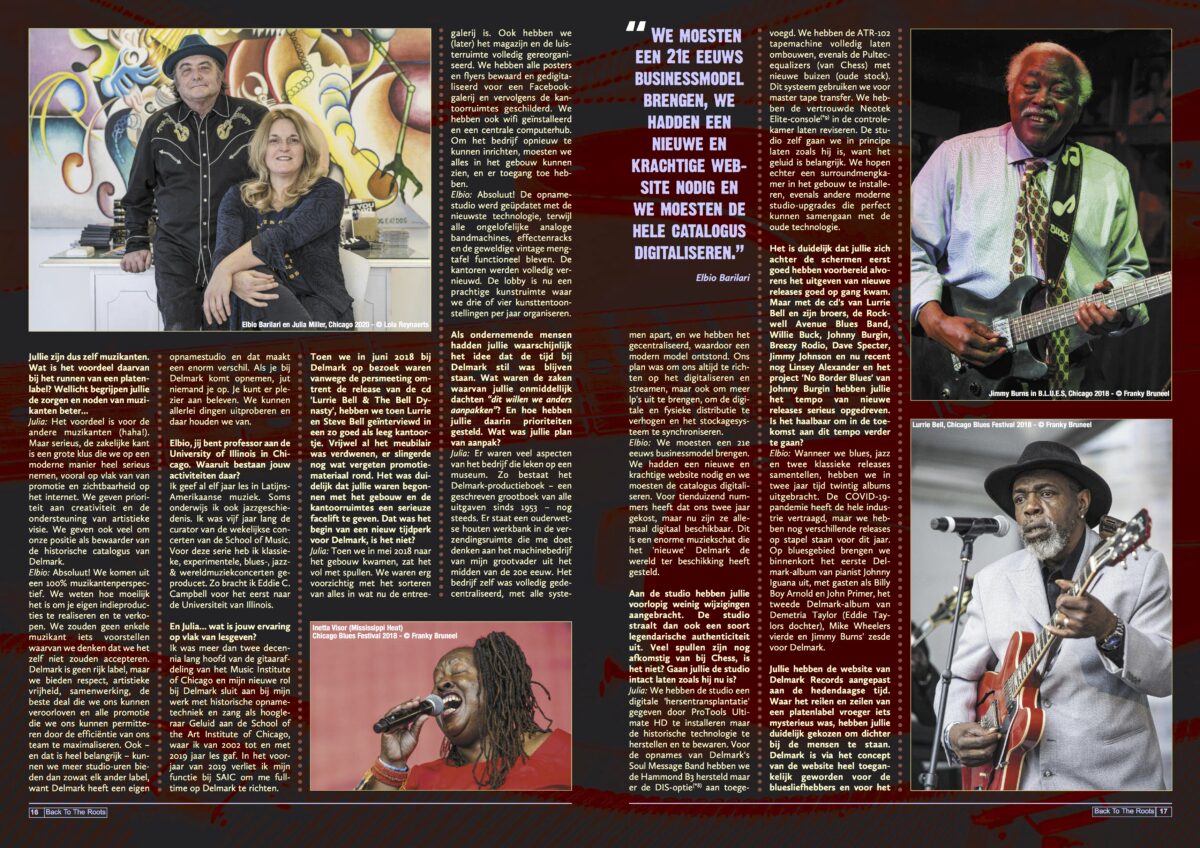
- So you are musicians yourselves. What is the advantage of being musicians while running a record label? Maybe you understand the concerns and needs of musicians better…
JULIA: The advantage is to the other musicians (haha!). But seriously, the business side is a big job, and we take that very seriously in a modern way – especially in terms of promotion and visibility on the internet. We prioritize creativity and the support of artistic vision. We also care very much about our position as custodians of Delmark’s historical catalog.
ELBIO: Absolutely. We come from a 100% musician’s perspective. We know how difficult it is to do your own indie productions and sell them. We would not propose to any musician anything that we think we couldn’t accept ourselves. Delmark is not a rich label, but we offer respect, artistic freedom, collaborative work, the best deal we can afford and all the promotion we can afford by maximizing the efficiency of our team. Also, and this is very important, we can offer more studio hours than pretty much any other label, because Delmark has its own recording studio and that makes an enormous difference. When you come to record at Delmark nobody is rushing you, you can have fun. We can and we like trying things.
- Elbio, you’re a professor at the University of Illinois in Chicago. What are your activities there?
ELBIO: I have been teaching for 11 years the course of Latin American Music. Sometimes I also teach Jazz History. For 5 years I was the curator of the School of Music weekly concerts. I produced classical, experimental, blues, jazz & world music concert for these series. For example, I brought Eddie C. Campbell, for the first time, to the University of Illinois.
- Julia, what about your teaching experience?
I was the head of the Guitar Department at the Music Institute of Chicago for more than two decades, and my new role at Delmark ties in with my work with historical recording technology and song as a professor of Sound at the School of the Art Institute of Chicago, where I taught from 2002-19. I left my position at SAIC in the spring of 2019, to focus on Delmark full-time.
- When we visited Delmark in June 2018 for the press meeting about the release of the CD ‘Lurrie Bell & The Bell Dynasty’, we interviewed Lurrie and Steve Bell in an almost empty office. Almost all the furniture had disappeared, there was still some forgotten promotional material lying around. It was clear that you had started to give the building and the offices a serious facelift. That was the beginning of a new era for Delmark, wasn’t it?
JULIA: When we came to the building in May of 2018, it was full of stuff. We were very careful to sort through everything in what is now the front gallery space. We also (later) completely reorganized the warehouse, and the listening room. We kept all of the posters and flyers, and digitized them for a Facebook gallery, and then painted the office spaces. We also installed WiFi, and a central computer hub. In order to reimagine the business, we needed to be able to see, and to access, everything in the building.
ELBIO: Completely. The recording studio was updated to the newest technology while keeping functional all the unbelievable analogue tape machines and effect racks and the great vintage sound board. The offices were completely redone. The lobby is now a beautiful art space where we host 3 or 4 art exhibits a year.
- As enterprising people, you probably felt that time had stood still at Delmark. What were the things you immediately thought about “we want to do this differently”? And how did you prioritize that? What was your plan of action?
JULIA: There were many aspects of the business which were like a museum. For example, the Delmark Production Book – a written ledger of all of the releases back to 1953 – still exists. There’s an old-fashioned wooden workbench in the shipping area which reminds me of my grandfather’s machining business from the middle of the 20th century. The business itself was completely decentralized, with all of the systems separate, and we centralized it, creating a modern model. Our plan was always to focus on digitizing and streaming, but also to put more LPs out, as well as to radically increase digital and physical distribution and sync placement.
ELBIO: We needed to bring a 21st century business model, we needed a new and powerful website and we needed to digitize the catalogue. It took us 2 years to digitize 10 thousand songs but now they are all available digitally. This is an enormous music treasure that the “new” Delmark has made available to the world.
- You made almost no changes to the studio so far. The studio radiates a kind of legendary authenticity. A lot of stuff hails from Chess, isn’t it? Are you going to leave the studio intact as it is now?
JULIA: We gave the studio a digital “brain transplant” – installing ProTools Ultimate HD and keeping or repairing the historical technology. We redid the Hammond B3 for Delmark’s Soul Message Band record, also adding the option of Dis to the instrument. We had the ATR-102 tape machine completely rebuilt, as well as the Pultec EQs (Chess) with new/old tube stock. This is the system we use for master tape transfer. We had the trusty Neotek Elite console in the control room reconditioned. We are going to essentially leave the studio as is – because the sound is important. However, we hope to install a surround mixing suite in the building, as well as other modern studio upgrades to partner with the ancient technology.
- It’s clear that behind the scenes you have prepared yourselves well before the release of new albums took off seriously. But with the CD’s of Lurrie Bell and his brothers, the Rockwell Avenue Blues Band, Willie Buck, Johnny Burgin, Breezy Rodio, Dave Specter, Jimmy Johnson and now recently Linsey Alexander and Johnny Burgin’s project ‘No Border Blues’, you have enormously accelerated the pace of new releases. Is it feasible to continue at this pace in the future?
ELBIO: Including blues, jazz and 2 classical releases we put out 20 records in 2 years. The COVID pandemic has slowed down the whole industry but we still have several releases pending for this year. In the blues field we will release the first Delmark album by pianist Johnny Iguana with guests such as Billy Boy Arnold and John Primer, the 2nd Delmark album by Demetria Taylor (Eddie Taylor’s daughter), Mike Wheelers 4th album and Jimmy Burns 6th Delmark’s album.

- You have adapted the website of Delmark Records to today’s times. Where the ins and outs of a record label used to be something mysterious, you’ve clearly chosen to be closer to the people. Through the concept of the website, Delmark has become very accessible for blues lovers and for the public itself. This must have been a deliberate choice. Can you tell us more about this?
JULIA: The website is the center of the business. Ecommerce and social media are the future, and we’ve designed the whole business around that. We hope to have even more social interaction in the future, as well as historical articles and a newsletter.
- You have also started to focus more on modern trends such as offering downloads. Nowadays, what is the ratio between the income from downloads and the income from effective CD sales?
JULIA: Streaming is crucial to a record label these days. CD sales are less than they were, and LP sales (and other boutique media, like reel-to-reel) have increased.
- Many people are of the opinion that CDs will eventually disappear while others claim that CDs will never disappear because artists want to sell something tangible during their performances and because many enthusiasts still want to put something physical in their collection box. What do you think about this?
JULIA: We will keep producing CDs as long as artists and audience ask for them. We also offer digital download cards currently with LPs, and are open to other physical forms – like 45s!
- And yet you do not leave the real audiophiles out in the cold. You’ve started offering reel-to-reel tapes from the most successful Delmark albums ever. For blues lovers there is already the reel-to-reel of Junior Wells’ Hoodoo Man Blues’ and soon there would be one from Magic Sam. There’s a hefty price tag on those reel-to-reels. Could you give us a little bit of an introduction in this matter? What exactly is such a reel-to-reel, why is it so expensive and what kind of audience buys this?
JULIA: Our reel-to-reels are first generation copies of our masters, created in an all-analog process (no digital involved) for listeners who choose that listening experience. There is a worldwide “audiophile” audience which enjoys playing and listening to tape, and the Delmark catalog is perfect for that.
- Were there any Delmark-releases sold out over the years? And if so, will you make them available again?
JULIA: Yes, many. We are working on a complete digital AND physical catalog – we may make titles available with CDs “on demand” – and we are working on putting 30-40 titles back in, first on CD then eventually on LP.
- As you know, we have become close friends with many musicians from the Chicago blues scene over the years and Delmark has some of them. When we checked with them for their first impressions of the new Delmark, we only heard positive reactions. Everyone told us that they feel that the artists get more support and guidance from the label. Also in terms of promotion and public relations and so on. Is that also a facet that you have very deliberately expanded and improved?
JULIA: We appreciate the Delmark family! We are happy to support all of the great music and great people.
ELBIO: Yes, we are musicians. We know what we, as musicians need, we try to provide that to our fellow artists. Again, Delmark is not a wealthy label, but it is a very welcoming and warm label.
- Throughout its history, Delmark has been a blues label that mainly focused on artists from Chicago. Will that remain the intention in the future? Or do you have plans or ambition to lure national and/or international blues acts to the label?
JULIA: Delmark just released No Border Blues, a record of all-Japanese musicians influenced by Chicago Blues musicians who toured Japan. The record is led by Johnny Burgin and produced by Stephanie Tice.
ELBIO: We will maintain the focus in Chicago blues but it doesn’t mean we would not release albums by blues artist based on different parts of the country or the world. If John Mayall wants to come to Delmark he will be welcome with open arms.
- In August 2019 the very good news came that promotion manager Kevin Johnson – who had already worked for Delmark from 2005 to 2017 – was re-employed. For many media, including us, Kevin was a reliable contact. He’s also really passionate about blues music and we all think it’s a good thing he’s back. We understand that his resignation was a cost-cutting measure at the time. From what point of view did you think his return to Delmark was important?
JULIA: All we know is we needed Kevin back, and we brought him back. He does an incredible job and he adapted very well to the “new” Delmark.
- For almost 33 years, producer Steve Wagner has been the man behind the mixing table at Delmark. He has over 500 albums on his record. On May 1, Delmark Records announced his departure. Steve has been very important to Delmark. He has always tried to capture the natural sound of the artists. He never created some kind of unnatural radiophonic sound out of commercial considerations. It had to sound pure and true. Many artists and fans of Delmark Records will miss him. Who’s going to take over his duties?

ELBIO: We recognize Steve’s contribution to Delmark and he will be always a friend. As far as engineers well, we are in Chicago, we have a wide variety of experienced engineers to work in different projects. Also, Julia Miller is a very good sound engineer, very knowledgeable, and she taught classes in studio techniques at the prestigious School of the Art Institute of Chicago for many years.
JULIA: We appreciate Steve’s knowledge and experience and consider Steve a friend. Steve had a two-year contract, and he decided to take some well-deserved time, after 33 years.
- A lot of record labels don’t have their own recording studio. For new releases, those labels have to buy studio time elsewhere, which might create more pressure. In your own studio you have everything under control. But is it profitable to run your own studio in 2020? Do artists who are not on Delmark Records also make use of your Riverside studio?
JULIA: Yes, it is profitable and yes, many artists come to record their productions in our Riverside Studio, as a rental. Also, we are operating in COVID stages 3&4 with masks and social distancing.
- How did you experience the corona crisis? What impact did this have on the label’s activities? For example, have you postponed releases because of corona because it is better for a CD to be released when the artist can tour again?
JULIA: In terms of the business, we kept essential operations, including shipping, and worked extensively from home. Since we are a digitally-oriented business, we redoubled our focus on this, implementing the “COVID pivot” to even more online work. We have become very familiar with zoom. Businesses are running 2-4 months behind, and shipping has been impacted, especially internationally. Releases slated for May were generally postponed by distribution, but that schedule is beginning to catch up. Delmark Records LLC received a PPP loan, which helped a lot and is a testament to the solidity of the business.
- A number of Delmark artists have been active during the corona crisis with solo performances from home, which they stream on their Facebook page. Of course, the virtual tip bucket was always there. We’ve met you many times during the weekly lockdown concerts of Jimmy Johnson and Jimmy Burns. How do you feel about this phenomenon?
ELBIO & JULIA: we were very worried about the lack of income from live gigs and also the depression of not being active. Actually, the live streaming works fine and we have been supporting out artists very strongly, even with an online live calendar that you readers can find at delmark.com. We are also starting to stream live from the Delmark studio. As for Jimmy Johnson and Jimmy Burns, the homebound streaming has been a great touchstone, and we love listening to them every Saturday.
- There are also artists who did not give any virtual lockdown concerts at all. Some have ended up under the radar because of corona. Do you think corona has compromised the careers of some artists?
JULIA: The lack of touring has been a challenge. But, the world is changing and it’s important to go with that.
ELBIO: May be, but not with Delmark artists, they are all ready to go!
- When you review the new Delmark Records two years after the takeover, what’s the state of affairs of the label? Is the turnout better? Is Delmark Records back in line and is there a positive perspective for the future?
JULIA: From a business perspective, the two-year mark is a classic benchmark. We’ve hit that, and passed it. We’re VERY proud of everything that has been accomplished in such a short time.
ELBIO: We knew we needed to adapt the business model to the 21st century and we did it. The turnout is great and the perspective is very positive.
- What are your plans for the future? Where do you want to go with Delmark Records? What are your goals and aims?
JULIA: We’ve touched on many goals throughout this interview: studio upgrades, more distribution, more records back into print, new releases, a newsletter. I’m very excited about the addition of streaming to the studio. And maybe we’ll release Volcano Radar on LP!
ELBIO: We will keep alive the rich Delmark history and catalogue and we will add new recordings by existing Delmark artists and new artists that are the future of the blues music. Delmark is an international label, based in Chicago but already open to the world.
***
VISIT “BACK TO THE ROOTS” WEBSITE: https://www.backtotheroots.be/
“BACK TO THE ROOTS” FACEBOOK PAGE: https://www.facebook.com/BluesmagazineBackToTheRoots/


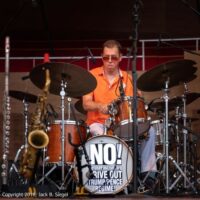


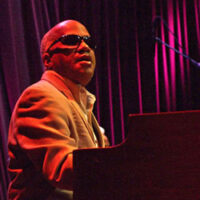













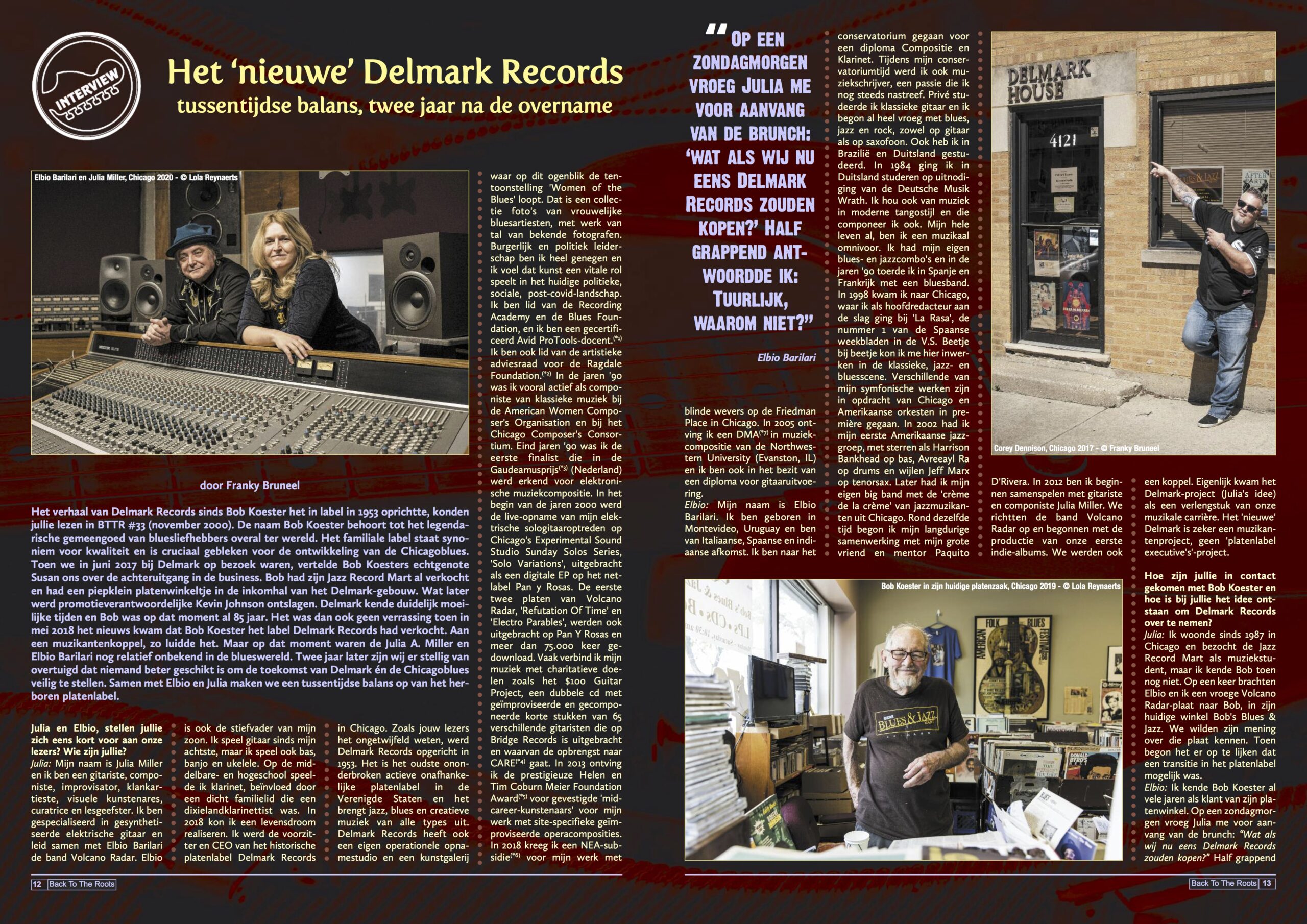
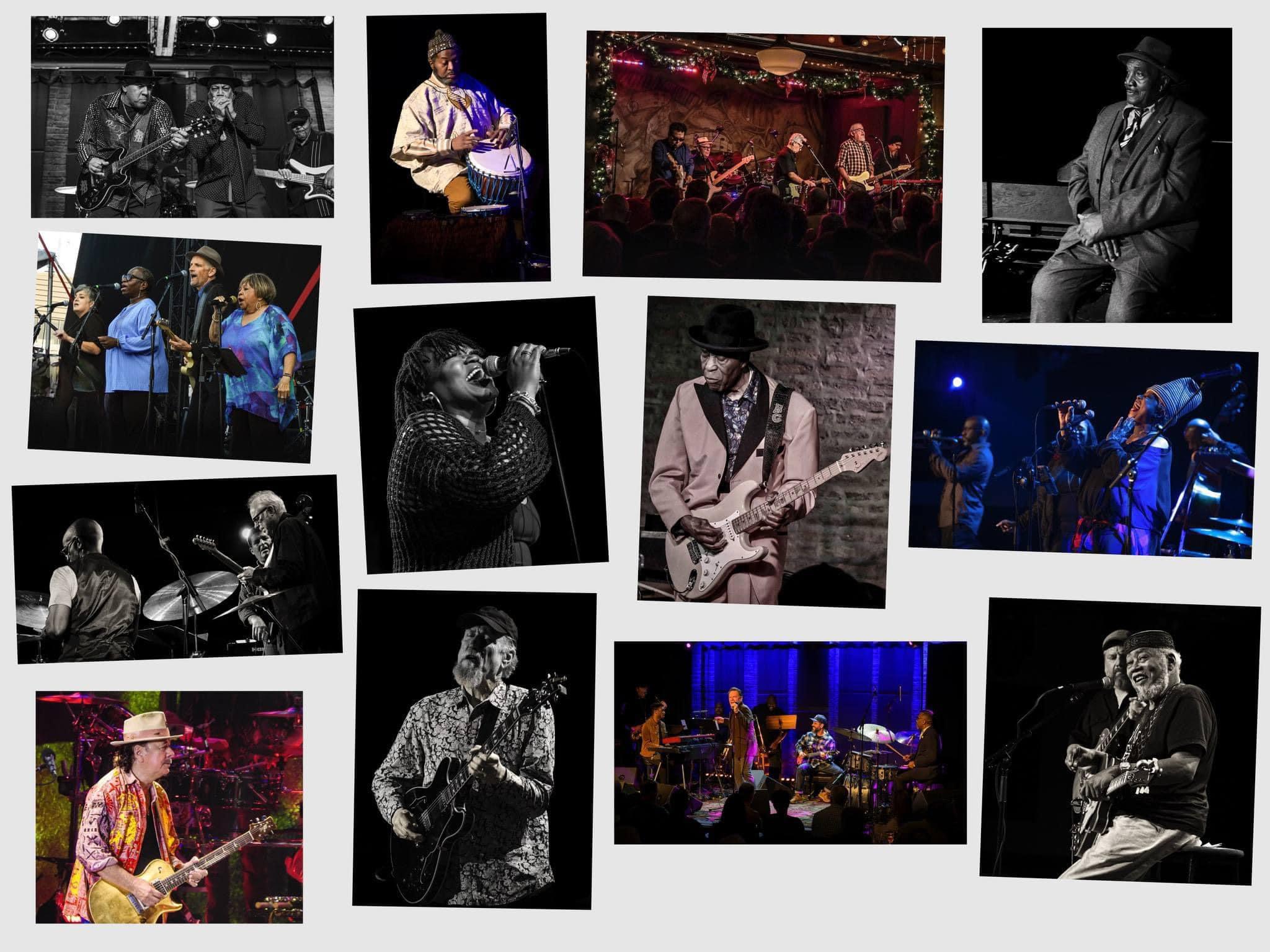


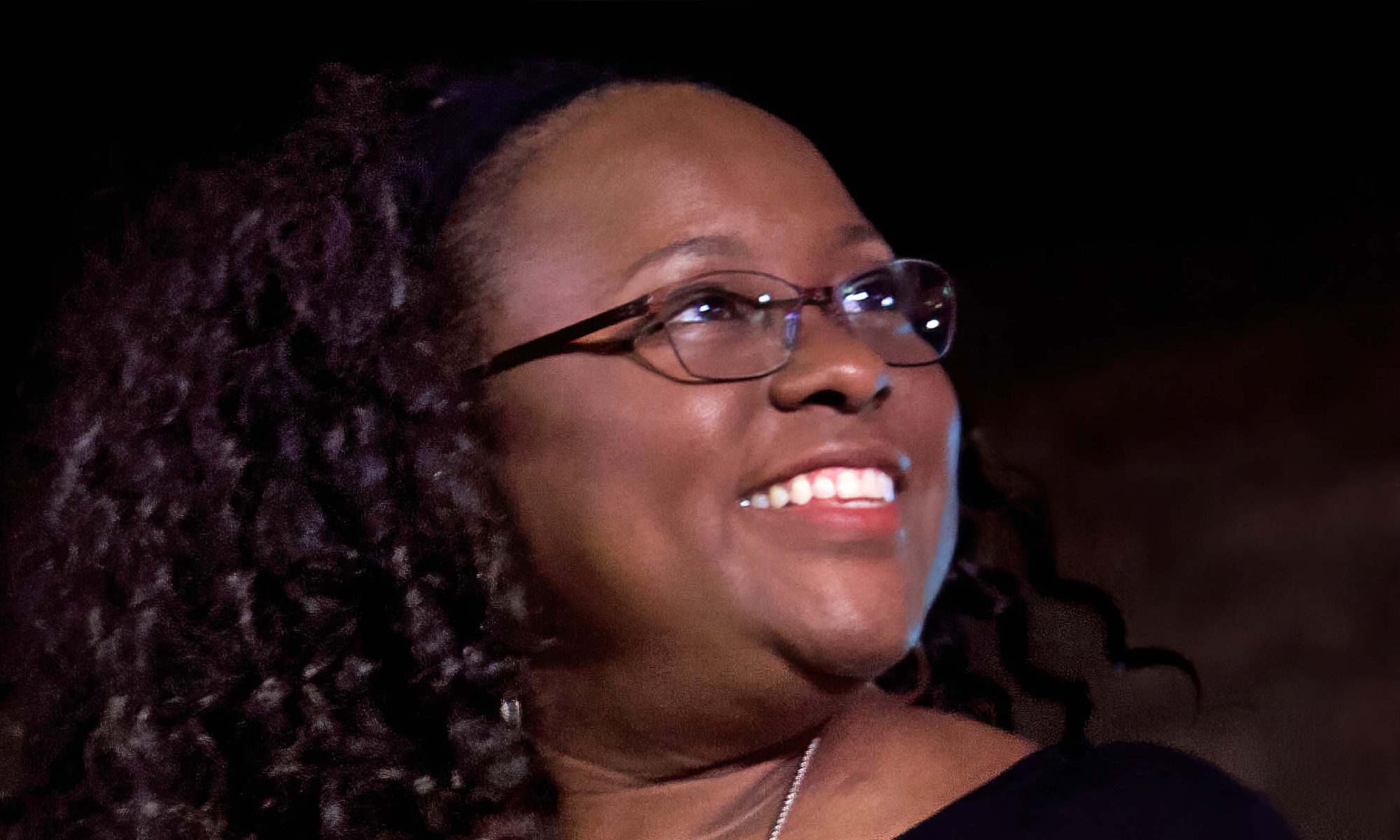
Excellent interview!!! I am very impressed with the bios of Julia and Elbio. There is lots of valuable experience with this mighty duo! Wishing Delmark another 50 years or more of making American Music……
What a great way for the public to get to know Delmark again, and the fine efforts to expand Delmark, by Elbio and Julia. Back to the Roots has always been a staunch support, for the Chicago Blues artists such as myself, and the wonderful, deep wealth of Chicago Blues history. To bridge two stalwarts like this, is a sign of hope for the future, in these uncetain times of covid. Right on!